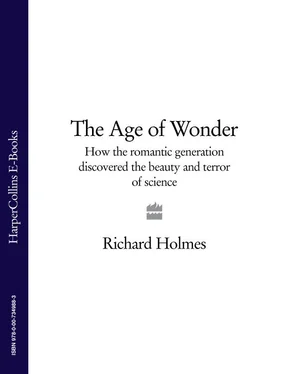In fact Harriet was one of three sisters who lived with their widowed mother in Holborn. Banks does seem to have been genuinely fond of her, and subsequent events suggest there was some kind of understanding between them. Her guardian James Lee looked upon it as an unofficial engagement, which would be announced if Banks should return alive from the Pacific. There was also some joke about Harriet knitting a set of ‘worked’ waistcoats for Banks while he was away, patterned with wildflowers-perhaps one for each season he was absent. 15
Yet Banks was certainly cautious about marriage at this stage in his career, remarking drily to a friend that though he loved experiments, matrimony was ‘an experiment…with uncertain consequences’, and rarely brought lifelong happiness. The eve of his great voyage was certainly not the moment to try it. 16 In a rare introspective entry Banks would reflect in his journal that he would probably never see Europe again, and that there were only two people in the world who would truly miss him. ‘Today for the first time we dined in Africa, and took our leave of Europe for heaven alone knows how long, perhaps for Ever; that thought demands a sigh as a tribute due to the memory of freinds left behind and they have it; but two cannot be spared, t’would give more pain to the sigher, than pleasure to those sighd for. Tis Enough that they are rememberd, they would not wish to be too much thought of by one so long to be seperated from them and left alone to the Mercy of winds and waves.’ 17
If these two were his mother and his sister Sophia, then he did not wish to sigh unduly for Harriet Blosset. A certain bluffness was in order. When asked why he did not settle for the security of the eighteenth-century Grand Tour, the object of which as Dr Johnson said was to visit the classical civilisations along the shores of the Mediterranean, he replied briskly: ‘Every blockhead does that; my Grand Tour shall be one round the whole Globe.’ 18
Banks spent his last night before going aboard at the opera. Then he dined in company with Harriet Blosset at her mother’s house, accompanied by a Swiss geologist, Horace de Saussure, who assumed from their behaviour that they were ‘betrothed’. Saussure described Harriet as very pretty and attentive, but ‘a prudent coquette’, and Banks as quite reconciled to their imminent parting, and drinking rather too much champagne. 19
When the naturalist Gilbert White, snug in his Hampshire village, heard of Banks’s departure on the high seas, he wrote thoughtfully to their mutual friend Thomas Pennant: ‘When I reflect on the youth and affluence of this enterprizing young gentleman I am filled with wonder to see how conspicuously the contempt of dangers, and the love of excelling in his favourite studies, stands forth in his character…If he survives, with what delight we shall peruse his Journals, his Fauna, his Flora! If he falls by the way, I shall revere his fortitude, and contempt of pleasures and indulgences: but shall always regret him.’ 20
Through the brilliance of Cook’s navigation, and the skill of his crew management, the Endeavour arrived at Tahiti with over six weeks in which to prepare for its main task, the transit observations. Previous expeditions had often been decimated by this stage, but Cook had lost only four men, and none to disease. The crew’s diet included a serving of cabbage sauerkraut ‘fresh every morning [as] at Covent Garden market’, and Banks had shot seabirds wherever possible for fresh meat, including several large albatross with nine-foot wingspans.
The first death was the result of an accident with an anchor chain in Madeira. The next two occurred on land, and involved Banks. A field expedition he was leading had been overtaken by a snowstorm on Tierra del Fuego. It was a grim and confused story, which revealed something of Banks’s qualities in a crisis. The party of twelve men (including Green, Solander and several sailors) had first run into trouble when one of Banks’s young artists, Alexander Buchan, suffered an epileptic fit. Then a sudden blizzard cut off their retreat to the ship, several hours away down the mountains, and the party became separated in a birch wood as night fell.
Overcome by the biting cold, Banks’s two black servants drank a stolen bottle of rum, and lay down in the snow and refused to go on. Meanwhile Solander, always rather stout and unfit, simply collapsed. Disintegration and disaster threatened the entire expedition. As darkness came on and the temperature plummeted, Banks tried to hold them together. First he regrouped the scattered men further down the mountainside with Green, made a fire and organised a brushwood ‘wigwam’, where Buchan was revived. Then Banks went back through the sub-zero night, with as many hands as he could muster, to drag the half-conscious Solander down through the birch wood to safety. It was an act which cemented their friendship. Banks also sent hands to save his black servants, but they were ‘immoderately drunk’, and could not-or would not-be carried back to the camp.
It was now past midnight, and everyone was stunned with cold, but Banks went out again in a last attempt to save them. ‘Richmond was upon his legs but not able to walk, the other lay on the ground insensible as stone.’ Banks tried to light a fire, but it was doused by falling snow. It was ‘absolutely impossible’ to bring the two men down. Finally he laid them out on a bed of branches, covered them with brushwood, and left them, hoping they would survive the night, insulated by alcohol. Going back at dawn, he found them both dead. 21
When the rest of the party finally returned to the Endeavour, Cook noted that they all retired to their hammocks except Banks. After making his report and classifying his specimens, he insisted on going out in one of the ship’s small boats alone, and spent the rest of the day in the bay, a solitary figure hunched over the stern, fishing with a seine net. Cook had not blamed him for his companions’ deaths; but for the first time perhaps, he felt the weight of his responsibilities.
The third death was a suicide in the Pacific. This revealed another side to Banks. He made a long, thoughtful entry over the incident, in which a young able seaman, ‘remarkable quiet and industrious’, had apparently jumped overboard after being accused of stealing a sealskin tobacco pouch from the captain’s cabin. Banks was struck by the melancholy event, remarking thoughtfully that ‘it must appear incredible to every body who is not well acquainted with the powerfull effects that shame can work upon young minds’. Cook did not pursue the incident, but it seems clear from Banks’s entry that he suspected homosexual bullying by an older member of the crew. 22
The initial days on Tahiti were obviously exciting, but curiously tense. There was the unfortunate shooting in the first week, and the scare over the quadrant in the third. Young Alexander Buchan was taken ill again, and died from what appeared to be a repeat of the epileptic fit in Tierra del Fuego. Banks wrote in his journal: ‘Dr Solander Mr Sporing Mr Parkinson and some of the officers of the ship attended his funeral. I sincerely regret him as an ingenious and good young man, but his Loss to me is irretrievable, my airy dreams of entertaining my freinds in England with the scenes that I am to see here are vanishd.’ Banks’s comments seem curiously harsh, and suggest his instinctive sense of entitlement. ‘No account of the figures and dresses of men can be satisfactory unless illustrated with figures: had providence spared him a month longer what an advantage would it have been to my undertaking. But I must submit.’ 23
This note would be repeated elsewhere in his journal. Yet the expedition’s other artist, the eighteen-year-old Sydney Parkinson, had no doubts about his employer’s humanity. He had witnessed how Banks had nursed Buchan in the Tierra del Fuego débâcle, and wrote a long entry in his own journal reflecting on Banks’s response to the unnecessary shooting of the Tahitian over the stolen musket. ‘When Mr Banks heard of the affair, he was highly displeased, saying, “If we quarrel with these Indians, we should not agree with Angels.” And he did all he could to accommodate the difference, going across the river, and through the mediation of an old man, prevailed upon many of the natives to come over to us, bearing plaintain trees, which is a signal of peace among them; and clapping their hands to their breasts, cried “Tyau!”, which signifies friendship. They sat down by us; sent for coa nuts; and we drank milk with them.’ 24
Читать дальше












